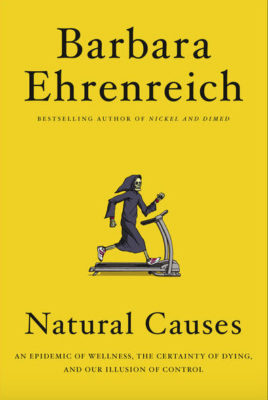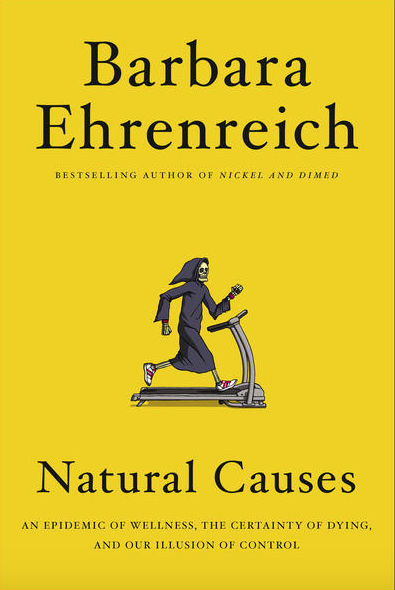Barbara Ehrenreich’s Natural Causes is a short, solid piece of prose about what it means to suffer from age, accepting the reality of death, and the sorts of things a person ought to consider when weighing both.

At seventy-six, the journalist and political activist says she’s realized that she’s now “old enough to die”, that is, her death will no longer be a surprise anyone or require any explanation beyond “natural causes”.
Therefore, she isn’t going to waste what time she has left on doctors visits, checkups, and examinations that have only a dubious relationship to longevity and certainly not to enjoyable longevity.
This realization serves as a jumping-off point for her to explore — mostly critically — all sorts of topics related to medicine, aging, and death.
The subtitle is “An Epidemic of Wellness, the Certainty of Dying, and Killing Ourselves to Live Longer”, but that doesn’t come close to fully describing her scope.
Ehrenreich is likely known to most people for her 2001 book Nickel and Dimed, and around that time was diagnosed with breast cancer.
Had she actually been living off of Wal-Mart wages and its related healthcare restrictions instead of investigating what it’s like, she might not have discovered the cancer then or survived it. But, as she says, calculations about how one ought to spend their time change from your late-50s to your mid-70s.
I also read this shortly after two studies of inequality and mortality rates received more publicity by way of a Washington Post analysis, most provocatively titled “Seniors Are More Conservative Because the Poor Don’t Survive to Become Seniors” when shared by New York Magazine.
This book also is not about that aspect of death and dying, although Ehrenreich touches on these related issues occasionally. Instead, it’s highly personal and particular to its author, suffering no shortcomings for that. Ehrenreich is very good at what she does, and writes with the confidence of someone who knows it.
She’s engaging and easy-to-follow even as she explains complicated concepts like cellular immunology — the field for which she originally earned her PhD—or when providing context to literary references, from Philip Roth to Shakespeare.
She knows she’s getting older but still has worthwhile things to say, and if she ever did tip-toe around saying them, she certainly isn’t going to waste time doing it now. This is two hundred and seven pages of pithy, burly prose.
Taken as a whole, though, Natural Causes comes across a bit like a writer who had a notebook full of subjects she was interested in, and rather than pick one to focus on depth, she dumped them all into her next contractural project.
It reads as a series of essays loosely grouped much more than the sequential chapters as labeled and vaguely segued.
Ultimately, I suspect Ehrenreich followed her own advice.
This is in no way slapdash, but the amount of extra work it would have required to turn this into a more coherent, polished product wouldn’t have elevated it that much more, and it wasn’t likely to push any of her earlier life’s accomplishments out of their place in the “obituary resume”, in any case.
Instead we got an entertaining look at some of her current concerns late in life:
- the disregard of modern medicine for patients as people and disregard for women’s pain in particular;
- the relative merits of New Age quackery and similarity of established medicine to ritual behavior;
- exercise as a form of exerting control over something in a mad world and how smoking cigarettes provides a similar function for low-wage workers;
- the agency of macrophages in fighting infection but also spreading cancers;
- how the sense of consciousness that evolved to be useful also turns against us;
- and how ego-destroying hallucinogens can help make death less frightening.
She has a mind that’s not predictable, so you’re never sure just where she’s about to go or will end up.
If you squint, there’s a through-line in there, but it’s a meandering one.
Natural Causes is delightful, sometimes disgusting, often disquieting, and always thought-provoking whenever Ehrenreich is on the attack, which is her default. When it comes to solutions, she definitely has something that works for her, at the age and place she is in life.
I don’t know how applicable it will be for others, but she also seems not to care to convince you of anything in particular at this point in her life.

